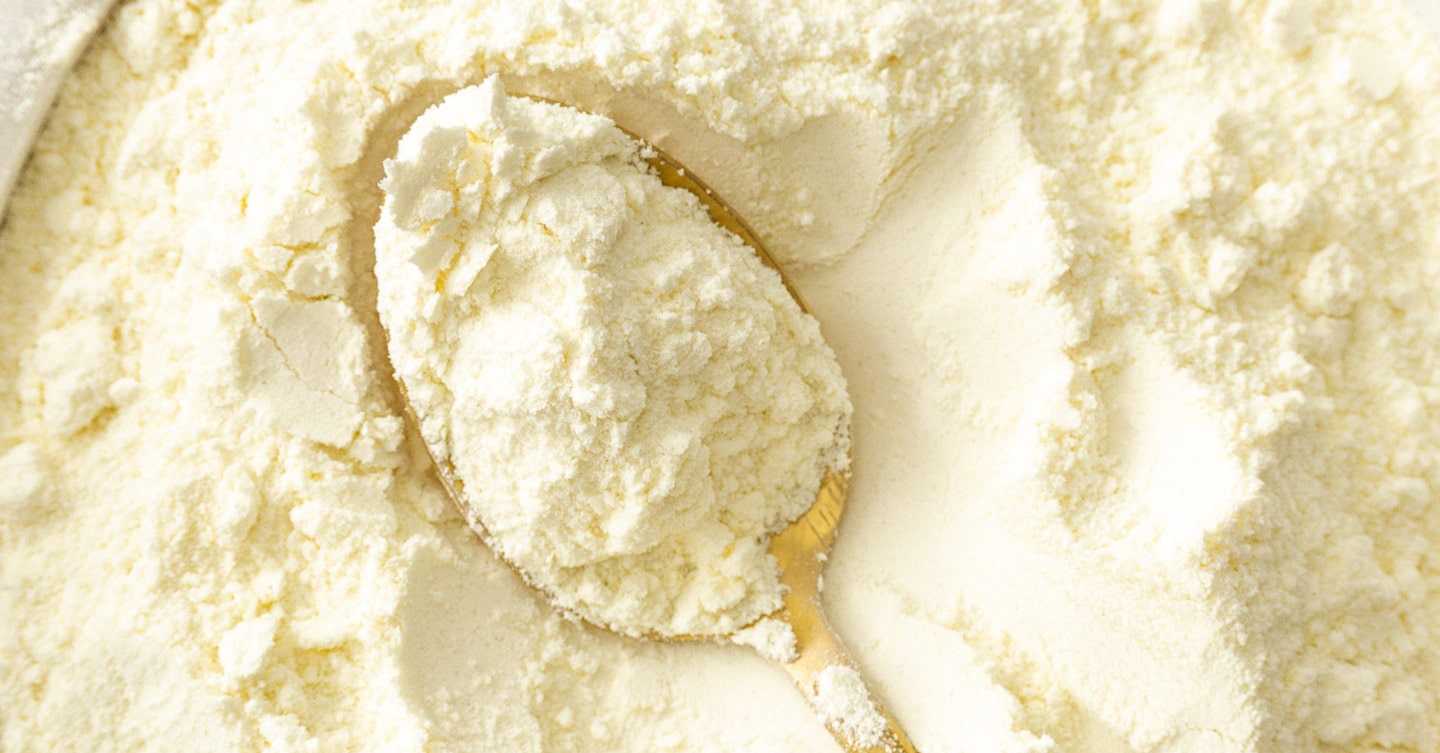Custard powder is a pantry staple used to make a smooth and creamy dessert sauce known as custard. It’s typically made from a combination of cornstarch, flavorings, and food coloring. To prepare custard, you mix the powder with milk and sugar and heat the mixture until it thickens into a creamy consistency. It’s a versatile ingredient often used for puddings, tarts, cakes, and other desserts.
The primary use of custard powder is to make custard sauce, which can be enjoyed on its own or as a topping for various desserts. In today’s post, we will be discussing the nutritional content and top nine health benefits of custard powder.
Nutritional Content of Custard Powder
Below is the nutritional value of custard powder per 100g serving:
- Sodium: 281mg
- Iron: 1.9mg (10% DV)
- Calories: 360 calories
- Potassium: 540mg (14% DV)
- Carbohydrates: 83g
- Cholesterol: 258mg
- Phosphorus: 332mg (33% DV)
- Calcium: 228mg (17% Daily Value – DV)
- Saturated Fat: 2g
- Vitamin B1 (Thiamin): 0.1mg (12% DV)
- Vitamin B6: 0.2mg (17% DV)
- Vitamin B2 (Riboflavin): 0.4mg (32% DV)
- Vitamin B5 (Pantothenic Acid): 2.2mg (45% DV)
- Vitamin B12: 1.2µg (49% DV)
Custard powder is also noted for its content of amino acids, including threonine, phenylalanine, tyrosine, cystine, and tryptophan.
Please note that these values are approximate and can vary based on the specific brand and composition of the custard powder.
Top 9 Health Benefits Of Custard Powder

Provide important Nutrients
Custard powder typically contains a range of essential vitamins, including B1 (thiamine), B2 (riboflavin), B6, and B12. These B vitamins play vital roles in converting food into energy, supporting nerve function, and maintaining healthy skin and vision.
Provide important Minerals
The minerals found in custard powder, such as calcium, iron, and potassium, offer various health benefits. Calcium is crucial for bone strength and density, while iron is essential for oxygen transport in the blood and preventing anemia. Potassium helps regulate fluid balance, nerve signals, and muscle contractions.
Good Source of Protein
Custard powder contains protein, which is composed of amino acids. Amino acids are the building blocks of tissues and are involved in numerous bodily processes, including muscle repair, immune function, and enzyme production.
May Provide Energy
The carbohydrates present in custard powder serve as a quick source of energy. Carbohydrates are the body’s primary fuel source, providing energy for daily activities and bodily functions.
Support Bone Health
Custard powder’s calcium content contributes to bone health. Calcium is essential for maintaining strong bones and teeth, and consuming calcium-rich foods supports bone density and reduces the risk of bone-related issues.
Support Blood Health
Iron in custard powder is vital for hemoglobin production, a protein that carries oxygen to tissues through red blood cells. Adequate iron intake supports optimal oxygen delivery and helps prevent iron-deficiency anemia.
Good Source of B Vitamins
B vitamins like B1, B2, B6, and B12 are crucial for energy metabolism, nervous system function, and the production of red blood cells. They also play roles in maintaining healthy skin, eyes, and cognitive function.
Support Amino Acid Composition
Custard powder contains specific amino acids, such as threonine, phenylalanine, tyrosine, cystine, and tryptophan. These amino acids contribute to protein synthesis, enzyme production, and various physiological functions in the body.
Provide Room for Dietary Flexibility
Custard powder’s versatility allows it to be incorporated into various dishes, enhancing their taste and nutritional value. This adaptability makes it easier to include it in a diverse and balanced diet.
Custard Powder Benefits For Skin
Custard powder’s potential benefits for the skin are attributed to its vitamin content, potential antioxidant properties, hydration support from milk, and the amino acids it contains, which contribute to overall skin health.
Benefits of Custard Powder for Babies

Custard powder is not typically recommended as a primary food for babies, especially as an early solid food. While it contains some beneficial nutrients, it is important to consider a baby’s specific nutritional needs and digestive capabilities. Breast milk, or formula, is the primary source of nutrition for infants. However, if you are considering introducing custard powder to your baby’s diet as they transition to solids, it is crucial to consult with a pediatrician or a registered dietitian before doing so.
Is custard Powder Good for Weight Gain?
Custard powder, when prepared as a dessert, can be relatively calorie-dense due to its carbohydrate content from added sugars and the milk used in its preparation. This could potentially contribute to weight gain if consumed in excess. However, it is important to consider the overall context of your diet and lifestyle.
If you are looking to gain weight, it is generally advisable to focus on consuming nutrient-dense foods that provide a balanced array of vitamins, minerals, and macronutrients (carbohydrates, proteins, and fats). While custard powder may offer calories, it might not provide the comprehensive nutrition needed for healthy weight gain.





